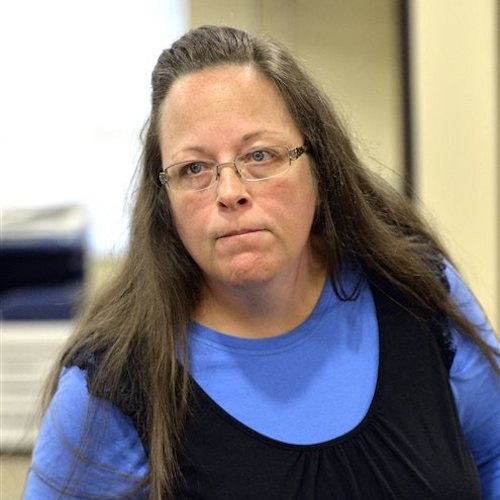The story has all the trappings of a media circus: A low-level official from a no-name county champions down-home religious beliefs in defying a top-down change in federal law. The tale of Kim Davis, a county clerk from northeast Kentucky who was jailed Thursday for refusing to issue same-sex marriage licenses, couldn’t have written itself any better for today’s hyper-partisan, social media-driven outrage machine.
Davis’ jailing made the Friday front pages of The New York Times, The Wall Street Journal, The Washington Post, USA Today, Chicago Tribune, and Houston Chronicle, among others. BuzzFeed News has published 15 Davis-related posts this week, averaging three a day. Bloggers from sites such as the Huffington Post have pounced on Davis’ story like a cackle of hyenas zeroing in on the nearest scent of blood.
Her saga is compelling, to be sure. Davis, an elected official, broke the law and is being punished. That story is worth covering. The question is one of proportionality, of whether the all-out media blitz of a lone-wolf scofflaw accurately tells the much larger story of conservative states’ implementation of the US Supreme Court’s June ruling to legalize same-sex marriage.
As liberal Washington Post writer Greg Sargent astutely pointed out in a post Tuesday, “if anything, the more important story here is how little of this sort of resistance we’re seeing.” Sargent cited data from Freedom to Marry, a gay-rights advocacy group, which polled county and parish clerks on whether they were issuing same-sex marriage licenses in Alabama, Kentucky, Tennessee, Mississippi, Louisiana, Georgia, and Texas: 826 of 841 were indeed following the new law as of Tuesday. In the seven other states where gay marriage had previously been illegal, Sargent writes, Freedom to Marry hadn’t learned of a single instance of noncompliance.
Of course, that broader story is more difficult to tell. It also doesn’t exude the same theatrical drama of Davis’ case—of one person taking a stand against the entire federal government. The Times’ front-page story Friday had racked up about 5,500 online comments and 78,000 social shares by 3pm, while the Post’s boasted roughly 11,000 and 44,000, respectively.
The outpouring of discussion has helped make Davis a symbol in the national debate over gay rights and religious liberty—she’s been made into a conservative martyr of sorts. And her tale has found its way onto the presidential campaign trail, which in turn has fueled yet more coverage and social media conversations.
With this story, as with so many others, journalists could argue they’re giving their audience what it wants. But with this story, as with so many others, the question is whether they should.
David Uberti is a writer in New York. He was previously a media reporter for Gizmodo Media Group and a staff writer for CJR. Follow him on Twitter @DavidUberti.

